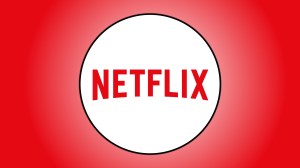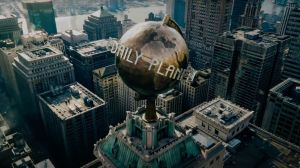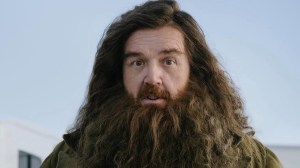Tonight’s Arrow finale marked the end of an era for The CW‘s DC Comics-inspired Arrowverse. The series that started it all concluded after eight seasons with an episode that honored Oliver Queen/Green Arrow as the hero who not only saved Star City but saved the universe as well with his “Crisis on Infinite Earths” sacrifice leading to a Multiverse reborn. But no person’s legacy can be easily put in one box and while Oliver Queen did, indeed do a lot of good, the character leaves behind a legacy that’s far more complex and a lot more flawed, something that the details of “Fadeout” highlights.
Videos by ComicBook.com
Spoilers for tonight’s series finale of Arrow, “Fadeout”, below.
Before we jump in, there is something that must be made clear: Oliver is a hero. Over the course of eight seasons, the character’s journey saw him make a real difference in his world by inspiring other heroes and striving to do what he thought was right for those around him. No one is denying that. But as the details of this newly formed reality and timeline he created, Earth-Prime, it’s clear that Oliver’s choices and sacrifices weren’t always altruistic. He “fixed” things – but in a way that served his idea of what reality should be.
Oliver rebuilt Earth in his image. One of the things that the finale establishes is that, at least in terms of Star City and those he was closest to in life, Oliver gave them realities and lives that aligned with what he thought was best for them – not necessarily what might have been their choice. For example, he brought back his mother and Tommy and Quentin. He also restored Baby Sara and even Emiko. Queen Mansion was raised from the ashes and it appears that Queen Consolidated was restored as well. He rebuilt his idyllic life. Those are generally good things.
But there are some choices that were just…strange. For starters, while he was fixing everyone’s lives, Roy sill lost an arm. Arguably, Oliver could have corrected that as he had to “restore” Roy from having been destroyed with Earth-1. Thea appears to have gone through, well, everything she went through over the years. Her face remained scarred and it appears that her experiences from the whole series were left intact while Emiko appears to have been given a fully clean slate with Moira and Thea being instantly accepting of her. Why solve pain and trauma for one sister, but not the other? It could be argued that Oliver didn’t or couldn’t change the history of any of the “heroes” which would explain why Thea and Roy’s lives remained intact, but then there’s the issue of Earth-1’s Laurel.
Oliver brought back from the dead everyone important to him with the major exception of Earth-1 Laurel and his father. It’s noted that Oliver couldn’t do anything to change his own path which is why he couldn’t restore his father – it would have stopped him from becoming Green Arrow – and one could argue that same point for Laurel as her death was an important moment for Oliver. That explanation would have been acceptable. However, it’s the “fix” for Tommy as related to Laurel that just comes off as cruel. We know that Earth-2 Laurel remained on Earth-Prime. She has a touching moment with Quentin about her guilt about it. Then, at the funeral we see Tommy, alive and well and he sort of drops a bombshell: in this new Earth-Prime reality, Tommy was married to Laurel-1. Now, it’s not clear if their marriage occurred prior to her “canon” death a few years previously – if Tommy hadn’t died in the Undertaking it’s likely they would have gone down that path – but the fact remains that Oliver gave Tommy a happy ending by having married the woman he loved only to also give him a life in which she’s no longer part of his life and, more than that, just gone.
He gave his “best friend” Tommy the love of his life and then took her away just so Laurel-2 could exist. It means he also took away Quentin’s daughter, which is even further cruelty considering how much loss that man suffered. Quentin is wrong in his comfort to Laurel-2 that the situation didn’t need fixing.
That unsettling act of casual cruelty aside, there’s another big moment that calls into question Oliver’s heroics. At the very end of the episode, we’re taken back to Star City 2040 and the moment from Season 7 – pre-Crisis – where Felicity meets with The Monitor who takes her to see Oliver in a place there is no coming back from. That place ends up being a paradise-like afterlife where the pair can be together for eternity. We can debate what The Monitor’s presence in that moment means, but outside of that, the moment sets up the idea that Oliver’s new reality is a world in which Felicity would have a reason to want to leave behind her children, especially her daughter Mia who is at the most critical juncture in her adult life, a time in which she needs her mother. Oliver’s “gift” reality is one in which his wife puts her love for Oliver above their children so much that she opts to leave them willingly.
And all of these questionable things? They only encompass what we know of Arrow‘s part of Earth-Prime. The shifts in reality for DC’s Legends of Tomorrow, The Flash, Supergirl, and Batwoman are all still playing out. There may be more to be seen.
In the end, Oliver did save Star City and he saved the Multiverse. He did a lot of good during his time as Green Arrow, but it’s his ending choices in the reset of the world that show that for all his growth, Oliver Queen ended his heroic run much as it began: selfish and a little reckless at the expense of those he claimed to love the most. He is still heroic, but he’s also quite flawed and that might be the most important legacy of all.









